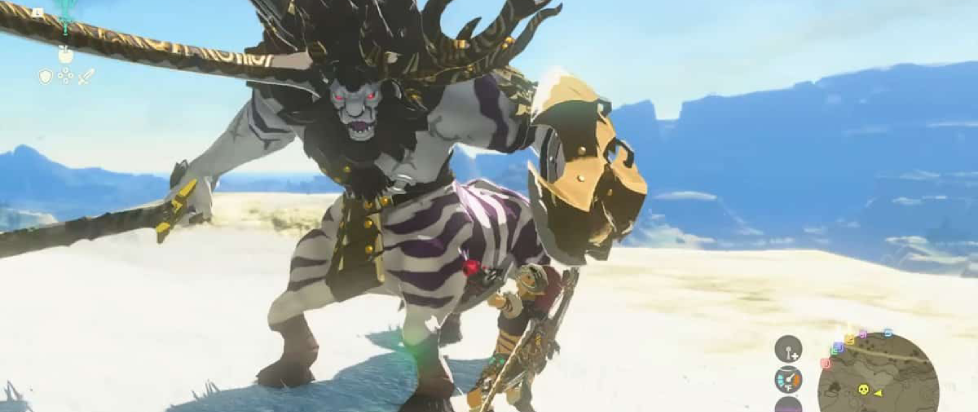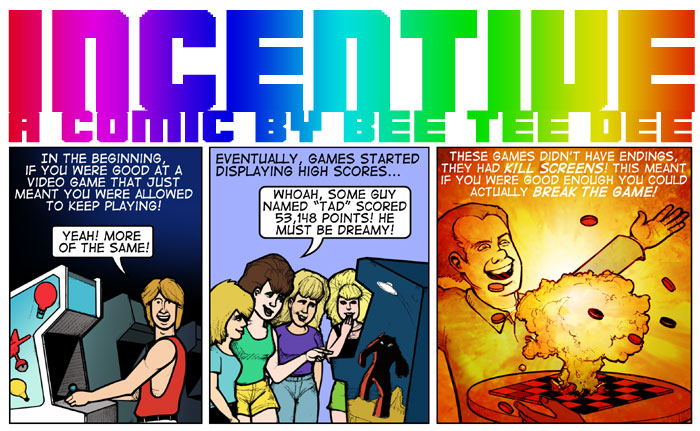
Fudge Around and Find Out: Tears of the Kingdom’s Link to the Childish Past
It’s a legend repeated as often as Link’s own tale that Zelda was inspired by Miyamoto’s childhood explorations in Kyoto’s countryside. That spirit lives on in The Legend of Zelda: Tears of the Kingdom, the latest in a series which, time after time, has evoked a fearless resistance to the very concept of limits; an attitude immediately familiar to anyone who’s ever told a toddler why they can’t jump on their bed or take a day trip to Jupiter.
Its liberating sandbox design that brings childish theme-park thrills and creative imagination to life is important, but it doesn’t stand alone. Hyrule feels so vast and full of endless possibilities thanks to a sly sleight of hand, the design equivalent of forced perspective that makes Link, ostensibly the driving force of the entire universe, feel as small as any child.
This paradox is just as important to making Hyrule a hypnotically inviting playground as its pastel-shaded landscapes, pliant emergent systems and gently encouraging soundscape. As a play philosophy, echoes of powerless childhood become an implicit nudge for players to break all confines and experiment. In age-appropriate terms, Tears of the Kingdom wants you to “fudge around and find out”.
You’re constantly reminded of your childlike status by the gentle indignity of how Hyrule regards its fabled hero. Zelda’s guardian knight saved Hyrule once already; he should command respect and authority across the realm. Yet wherever he goes, he’s greeted with overfamiliar, teasing humour like an enthusiastically fond aunt or uncle. In a familiar contradiction, they refuse to treat your grand goals with the seriousness they deserve, yet these patronising adults reward their adopted nephew for relatively trivial tasks with a fistful of rupees and dreadful jokes.
Hylians often loom over Link (who’s 5’2” at best), further pushing players into reliving the child-adult height imbalance we long hoped to outgrow. Like a child, I can greet these indignities only with silence – although at least these towering adults never tell me to tidy the mess I made around Addison’s signs.

But the best example of the game’s creation of child-like disempowerment is found in how you encounter the world. The game’s physics system function as a marvelously emergent slapstick-generator, a constant source of the unexpected whose secrets will take years to uncover. You learn the properties of each weapon, flora, fauna and Zonai contraption through a succession of happy accidents, haphazard mistakes and inedible meals. With gentle guidance from environmental cues, the odd inventory hint, and blurry recipes on stable walls, you piece this world together bit by bit.
The outcomes from this growing understanding of the world are equally familiar from childhood. So many of us tried to start a wooden Zonai-powered cart with a lit torch, just to watch it burn in front of us and fall apart. We’ve all been kids watching our bourgeoning understanding of physics fail us: you cry, you learn, you start again with the slowly accumulated wisdom of many errors. This is no different. Life, and Hyrule, are full of surprises you uncover one-by-one.
For a while, the game’s opaque combat and equipment frustrated me. Compared to other games, who’s rich, overlapping gear and weapons options assume mathematical precision, Tears of the Kingdom felt vague, clumsy and unsatisfying. But I’ve come to understand its lack of definition differently.
When a kid scrapes their knee, they only know that it hurts. In the same way, a hit from a Lynel is a wildly variably mystery. How far will its forceful hoof fling you into the air? How many hearts will you lose as a result? The precise amount varies so much that damage loses its quality as a game abstraction. Instead, it makes way for sheer sensation as you see Link ping across the screen, accompanied with a raw flash of pain and sadness as strings of heart containers drain away. And that anxiety is only heightened by the absence of helpful red numbers indicating exactly how much damage you dealt or suffered, or detailed inventory screens listing what percentage of a sword swipe your armor deflects.
This commitment to making the player feel small and impotent could be malicious in other hands. Dark Souls is a cruel bully with the same ethos, rejoicing in their latest cruel prank. Minecraft is an indifferent passer-by. Tears of the Kingdom instead takes an indulgent attitude that’s eager to help you back on your feet. Death has no consequence other than damage to your dignity, but, just like how you learned not to anger the family pet, you learned not to pull a Lynel’s tail this time didn’t you? At least not without a shambling mech for backup.
These goals aren’t new. After all, the series’ dialogue with childhood now approaches middle-age itself. But, in a reversal of parenting trends over the same period, it has become so much more liberating.
In Ocarina of Time, when Link snuck through Hyrule Castle to find Princess Zelda, he traversed a diorama of childish mischief under adult surveillance. If a guard spotted you, you’re snatched back to the start – a punitive instant-fail state that’s a mirror image of “go to your room”. Those childish confines return even in Link’s sombre adulthood, who is again powerless whenever captured in Gerudo Fortress, and yet again when reincarnated for The Wind Waker’s moblin-riddled Forsaken Fortress.

However, my favourite example of Zelda’s disempowerment, and perhaps its most enduring, are the oh-so-humble cuccos. In what remains gaming’s best animal welfare campaign, strike a cucco in a Zelda game and you’ll pay dearly. A swarm of indestructible cuccos swoop from the sky, your only options to either die or run to safety as Hylian pastures transform into a scene from Hitchcock’s The Birds. No amount of bombs can save you from a chicken scorned – even if Majora’s Mask’s Bunny Hood lets you outrun them). It’s a charming, long-running prank that says everything about the series’ unwillingness to let players get too big for their boots.
I didn’t always have so much respect for Zelda’s efforts to disempower me. When I was a kid myself, I defied Ocarina of Time’s efforts and used a GameCube cheat disc to defeat Ganandorf with infinite life. I angered the vengeful cuccos with the same cheats enabled and survived their fury.
Today, the Zelda series won’t send you to your room. But disempowering players in other ways is part of the quietly revolutionary shift in tone that separates it from the usual power fantasies associated with conquering an open world. It helps to throws back the years, however long ago it may be, to a time when a delightfully unknowable world was full of surprises.
As you grew in knowledge, the possibilities of the world around you shrink. By taking players back to childhood, Tears of the Kingdom is a rebirth for players as much as it is for Ganon, giving us a way to forget limits and discover a fresh new world; after all, a world with unknown limits is as good one without them entirely.
Don’t believe me? Fudge around and find out for yourself.
———
Francisco Dominguez is a communications professional and freelance writer from the UK. He enjoys removing double-spaces and expanding idle thoughts into features.





